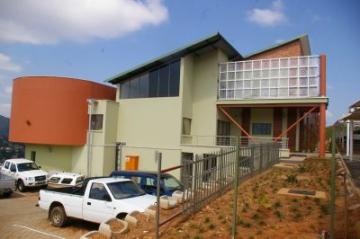DOOR-TO-DOOR HIV TESTS!
 Nercha offices in Mbabane.
Nercha offices in Mbabane.
MBABANE – Government plans to spend over E3.2 billion in five years on a new venture known as the ‘test and treat’ programme.
The Times SUNDAY understands that this is how government hopes to ensure that all Swazis get tested for HIV.
About 230 000 Swazis are said to be HIV-positive and government is on a mission to identify and enrol all of them on treatment.
Part of this money would be spent purchasing ARVs and financing other intervention measures in the fight against HIV.
Khanya Mabuza, Director of the National Emergency Response Council on HIV/AIDS (NERCHA), said government was currently studying the full financial implications of testing the whole nation for HIV, in the effort to implement the 90-90- 90 programme.
This is a new global strategy that sets ambitious targets for combating AIDS.
Swaziland wants to domesticate this strategy, which dictates that by the year 2020, the aim is to have 90 per cent of all people living with HIV aware of their status. Further, 90 per cent of those diagnosed would receive regular antiretroviral therapy.
At least 90 per cent of people being treated will have lasting viral suppression. Mabuza said the aim of the study, dubbed the Swaziland Investment Case Study (SICS), was to determine the scale of investment in the interventions aimed at maximising impact, benefits and efficiencies in the response towards HIV.
Presently, the cost burden to government for HIV drugs amounts to E200 million.
This figure would rise as more people get enrolled on treatment. Mabuza said the process of forming the Swaziland HIV Investment Case was at an advanced stage. A multi-sectoral team met at Pigg’s Peak hotel recently, to review and finalise a draft, which would soon be presented to NERCHA and UNAIDS senior management and stakeholders for review and adoption.
Participants at this meeting were drawn from the Ministry of Health, Ministry of Finance, Ministry of Economic Planning World Food Program (WFP), Clinton Health Access Initiative (CHAI), NERCHA and UNAIDS.
The Swaziland HIV Investment Case development process is informed by the recognition of the need to rethink the approach to HIV investments in Swaziland.
The idea to craft an Investment Case for Swaziland was conceived during the development of the extended National Multi-sectoral Strategic Framework on HIV and AIDS (eNSF). The eNSF will be implemented by NERCHA until 2018 with technical and financial support from the Joint United Nations Programme on HIV/AIDS (UNAIDS).
It was projected that the Investment Case will be finalised within one month. Mabuza said the Swaziland HIV Investment Case identified five game-changing interventions which demonstrated the greatest potential to meet the country’s HIV response objective.
These included scaling up Antiretroviral Therapy (ART), including the roll-out of treatment as prevention (TasP), Intensifying Voluntary Medical Male Circumcision (VMMC), intensifying HIV prevention programmes for girls and young women aged 15-24, scaling up of Prevention of Mother to Child Transmission of HIV and Intensifying the TB and HIV Co-infection programme.
According to information published on NERCHA’s website, the HIV epidemic was a long-term challenge for the country, one that requires a sustainable response.
Although Swaziland, over the past decade, achieved major gains in reducing the number of new HIV infections and preventing deaths from AIDS-related causes, progress has not been evenly shared across all the thematic areas of the response.
As premised on the national objective of attaining an AIDS-free Swaziland by 2022, the Swaziland HIV Investment Case (SHIC) aims to present an economic and calculated rationale for investing in five strategic HIV interventions, targeting populations and the anticipated health and economic outcomes. It also provides an important vehicle for Swaziland to deliver strategic, rights-based, sustainable responses to HIV.
The Swaziland Investment Case provides new opportunities to explore options for innovative funding and service delivery.
It will also help identify specific steps to enhance equity and inclusiveness for key populations, to use available evidence to better understand the health and economic benefits of timely, rights-based, smart HIV investments and to eliminate inefficiency in HIV programmes.
In addition to helping Swaziland with resource allocation and financing decisions, the Investment Case could serve as an advocacy instrument for dialogue with national and external partners, including resource mobilisation.




 del.icio.us
del.icio.us Digg
Digg
Comments (0 posted):